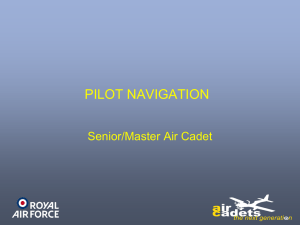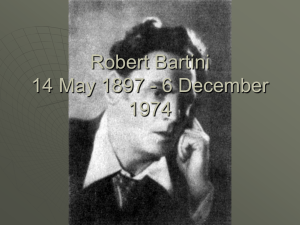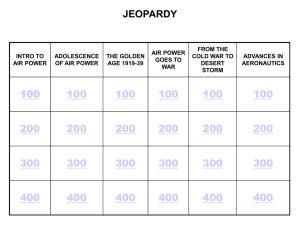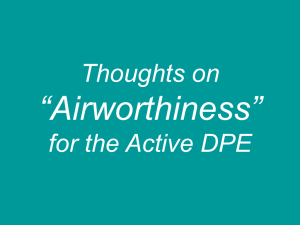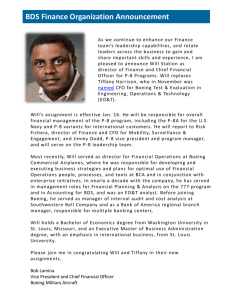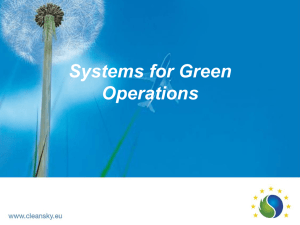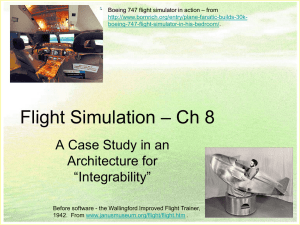S3B-Argon - The Associated Aerial Firefighters (AAF)
advertisement
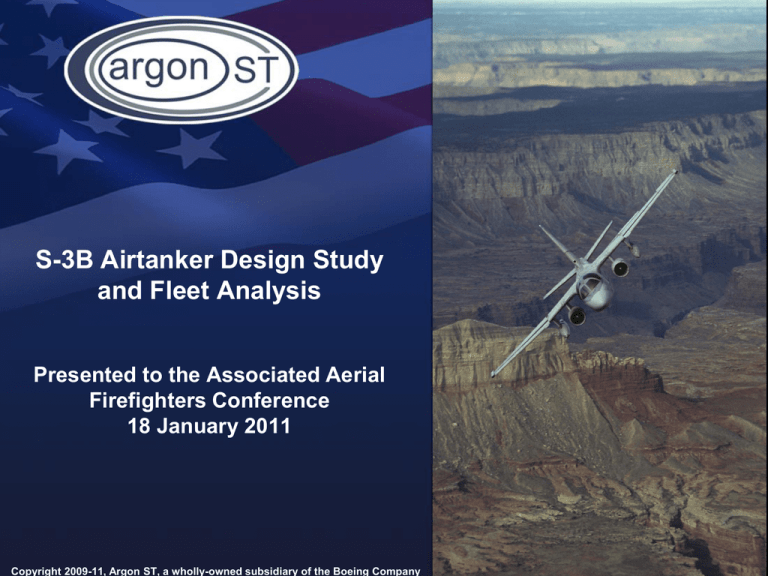
S-3B Airtanker Design Study and Fleet Analysis Presented to the Associated Aerial Firefighters Conference 18 January 2011 Copyright 2009-11, Argon ST, a wholly-owned subsidiary of the Boeing Company Aircraft Systems Introductions • Paul Wynns, Aircraft Systems Program Manager at Argon ST • Argon ST Active and Aircraft Systems Group, a subsidiary of The Boeing Company Copyright 2009-11, Argon ST, a wholly-owned subsidiary of The Boeing Company Slide 2 Aircraft Systems Objectives • Familiarize airtanker community with the latest, most accurate engineering data on the S-3B aircraft • Summarize Argon ST’s S-3B Airtanker Design • Compare S-3B Airtanker performance with current airtanker fleet • Describe available S-3B support organizations & services • Gather feedback to refine Argon ST’s ongoing engineering & research activities in support of fire aviation Copyright 2009-11, Argon ST, a wholly-owned subsidiary of The Boeing Company Slide 3 Aircraft Systems S-3 Viking - Overview Copyright 2009-11, Argon ST, a wholly-owned subsidiary of The Boeing Company Slide 4 Aircraft Systems Length: Wingspan: Height: Crew: Basic Weight: Max TOGW: Max Speed: Maneuvering Limits: Ceiling: Internal Fuel: External Fuel: Loiter Speed, 20,000 ft.: Approach Speed: Ferry Range: Endurance: General Arrangement 53 ft. 4 in. 68 ft. In. 22 ft. 9 in. 1-4 29,000 lb. (typical) 52,500 lb. 450 KTS (0.79M) +3.5g / -2.0g 40,000 ft. 13,144 lb. (1,933 USG) 3,604 lb. (530 USG) 210 KTS 110 KTS 3000+ nm 6+ hr. Inflight refueling capable Design Margins (Before airframe mod): Unused Weight: 18,500 lbs. Unused Volume: 180 cu. ft. Airframe life remaining: 11,000 hrs. (avg.) Copyright 2009-11, Argon ST, a wholly-owned subsidiary of The Boeing Company Slide 5 Aircraft Systems S-3B Airtanker Design Summary • US Government presented with a 250+ page design document describing performance, IATB compliance, and fleet cost analysis • Over 45 Navy publications and 120 OEM drawings analyzed • Most extensive S-3B airtanker engineering completed to date • Sponsored by Air Force Research Labs, NASA: All data available at zero cost to USFS 2000+ gal. mixed retardant payload, 450 KIAS max speed, 125-135 KIAS drop speed, fully IATB compliant, coverage levels 0.5 to 8 Copyright 2009-11, Argon ST, a wholly-owned subsidiary of The Boeing Company Slide 6 Aircraft Systems Suitability • Takeoff & Landing performance is suitable for most USFS firebases – Engine modifications & thrust reversers are not required – Upgrade to latest TF-34 engine variants would increase speed, payload, fuel efficiency • Engines & Airframe are proven in the fire aviation environment – Tens of thousands of flight hours in blowing sand, smoke, high temp. – Operating from forward-deployed desert airfields in hot climates • Analysis & US Navy Flight Test Data Predict Full IATB Compliance – S-3B airtanker will have lower drag count than existing US Navy flight test data Navy S-3B deployment to Al Asad, Iraq ’08 (VS-22) - 100% mission availability in desert environment S-3B Airtanker IATB Compliance S-3B IATB 90F, Sea Level Airtanker Requirement T/O Run 4,050' 6,000' Balanced Field Length 6,600' 7,000' SE Climb Rate 120 fpm 100 fpm Enroute Climb Rate 2250 fpm 100 fpm Copyright 2009-11, Argon ST, a wholly-owned subsidiary of The Boeing Company Slide 7 Aircraft Systems • • • • • Flying Qualities Enroute – Cruise altitudes > 10k’ as desired – 450 KIAS dash speed if needed FTA arrival and check-in – Excellent cockpit visibility – Loiter flap setting for orbiting Cruise altitudes allow high airspeeds, fuel efficiency Approach and descent – Upper/lower wing spoilers Spoilers allow rapid decel, controlled rates of descent – Up to 10,000 fpm controlled descent rate available, wings-level Final approach – 2g, 45 deg. AOB available – DLC (spoilers) allow power-on descent – 135 KIAS drop speed – 105 KIAS stall speed Exit – DLC automatically retracts spoilers – Full power immediately available – 3.5g available Flight controls designed for Cockpit visibility enhances SA in FTA Thrust, G available enhance exit safety stable low altitude maneuvering Copyright 2009-11, Argon ST, a wholly-owned subsidiary of The Boeing Company Slide 8 Aircraft Systems • Advantages of the S-3B Airtanker: – – – – – – – • Conclusions & Discussion Zero airframe, spares, GSE procurement cost Leverages nearly $2.0M of existing engineering work Access to $1.2B in airframes, spares, engines, and equipment Highly capable, cost-effective airframe with over 15 yrs. life remaining Airframes available now as a “gap fill” in advance of C-130J platforms Speed and flexibility complements VLAT and LAT platforms Support of AFRL Air Vehicles Integration Directorate and NASA Glenn Research Center; full cooperation of NAVAIR Argon ST, a wholly-owned subsidiary of The Boeing Company: A leading engineering and modification provider backed by the world’s leading aerospace company. Copyright 2009-11, Argon ST, a wholly-owned subsidiary of The Boeing Company Slide 9 Aircraft Systems Paul Wynns Aircraft Systems Program Manager 6696 Mesa Ridge Road San Diego, CA 92121-2950 Office: (858) 623-9424 x411 Mobile: (619) 994-7606 Fax: (866) 529-3133 Contact Information About Argon ST Argon ST is a leading developer of command, control, communications, computers, combat, intelligence, surveillance, and reconnaissance (C5ISR) systems that support operational commanders by producing and delivering information in time to impact critical decisions. Argon ST’s C5ISR solutions are currently at work on land, at sea, and in the sky. We support a full range of military and strategic units, including surface, sub-surface, airborne, and land-based platforms that serve defense, homeland security, and international customer needs. In today’s fast-paced and highly complex threat environments, Argon ST is driven by an overarching goal to help the warfighter make sense of the technology and threats facing our forces—and provide the capability to beat them. Paul.Wynns@ArgonST.com About Aircraft Systems Argon ST - Aircraft Systems (Ventura, California) was created to address unique airborne special missions. Aircraft Systems provides innovative and cost effective aircraft installation, operational, and support solutions to U.S. and foreign governments engaged in airborne missions which require advanced detection, analysis, identification, targeting, tracking, response, and networked connectivity capabilities aboard various types of multi-mission aircraft. Our design and engineering capabilities span the range of applied and theoretical disciplines associated with aerospace structures, mechanical systems, electrical systems, motion control, RF engineering, systems integration, and FAA/DoD airworthiness certification compliance. Our facilities and prototype manufacturing capabilities also include structures, mechanical, and electrical fabrication, assembly, test, evaluation and airworthiness compliance certification. Copyright 2009-11, Argon ST, a wholly-owned subsidiary of The Boeing Company Slide 10 Backup Slides Aircraft Systems Copyright 2009-11, Argon ST, a wholly-owned subsidiary of The Boeing Company Slide 11 Supportability Aircraft Systems • Maintenance – Most recent S-3B Iraq deployment • 4 forward-deployed aircraft • 3 flights a day, 6 months • 100% mission completion; no sorties lost to maintenance aborts • Continues the trend of 27%+ cost savings vs. the P-3 airframe • Lowest cost carrier-based aircraft – Over 80% average mission availability in Afghanistan, Iraq wars – TF-34 engines shared by USAF A-10s, commercial RJs – Over $1.2B in Navy spare parts, airframes, equipment – zero cost to USFS • Navy and NASA will continue to operate S-3B aircraft through 2015 • Engineering centers, depot, simulator facilities • All Navy, NASA S-3B facilities and services available to USFS or USFS contractors Cleveland, OH: NASA Glenn Research Center Point Mugu, CA: Naval Air Warfare Center Patuxent River, MD: S-3B Program Manager Jacksonville, FL: Naval Air Depot – AMARC re-activation costs for S-3B are 50% those of P-3A/C Copyright 2009-11, Argon ST, a wholly-owned subsidiary of The Boeing Company Slide 12 Aircraft Systems Structural Service Life • Full Scale Fatigue Test (FSFT) analysis completed in 2004 by OEM and Navy engineering teams • Tested two full scale models to failure against a tactical aircraft flight profile: – Did not use transport aircraft load spectra (e.g. P-3, C-130, B747, DC-10) – Tactical, low-altitude profile used instead • Results – Exceeded previous life estimates by 100% – 23,000 hr. service life certification; average airframe age is 12,000 hrs. – No re-winging required, 15-20 yrs. airtanker life remaining – “It would be conservative to use these hours to determine inspections or life limits on individual aircraft” – OEM FSFT Failure Analysis Report Copyright 2009-11, Argon ST, a wholly-owned subsidiary of The Boeing Company Slide 13 Safety Record Aircraft Systems • 1.7 million flight hours, 21 years operational service – S-3B’s Class A mishap rate is lower than the P-3C’s in USN service – 1 Class A involving engine failure – caused by human factors – 1 Class A involving vertical fin failure – caused by human factors – 2 Class A due to inflight fire – caused by maintenance malpractice – 3 Class A due to analog autopilot system malfunction – 4 Class A due to CV environment – 19 Class A due to CFIT or other human factors • Source: PMA-290C NAVAIR, NAS Patuxent River, MD Shore-based operational mishap rate: 1.06 per 100,000 flt. hrs. – • S-3B Class A Mishap Causal Factors All Years Excluding carrier operations System failure mishap rate: 0.118 per 100,000 flt. hrs. – – Excludes CFIT and human factors Excludes causal factors from legacy systems now upgraded/replaced Copyright 2009-11, Argon ST, a wholly-owned subsidiary of The Boeing Company Slide 14 Aircraft Systems – – – – – – – – – – – – Safety and Reliability Design Features Dual redundant hydraulic flight control systems Independent emergency hydraulic pump Independent emergency flight control system (EFCS) Triple redundant electrical power systems Dual redundant electrical pitch trim systems, each with automatic fault detection Dual redundant, 4-axis digital autopilot system Excellent single-engine flight characteristics, including waveoff / go-around Automatic elevator bias to relieve stick loads during flap transitions Automatic thrust/pitch compensation to minimize pitch changes with power Direct lift control for precise glideslope management Dual redundant channel, digital yaw damper – including single-engine modes Dual flight deck controls, dual instrument panels, cockpit optimized for pilot/copilot CRM Copyright 2009-11, Argon ST, a wholly-owned subsidiary of The Boeing Company Slide 15 Basing Aircraft Systems • Existing USFS bases recommended as candidates for S-3B airtanker: – – – – – – – – – – – – – Lancaster, CA (WJF: General Wm J Fox Airfield) Fresno, CA (FAT: Fresno Yosemite) Klamath Falls, OR (LMT: Kingsley Field) Moses Lake, WA (MWH: Grant County Airport) Missoula, MT (MSO: Missoula International) Boise, ID (BOI: Boise Air Terminal) Knoxville, TN (TYS: McGhee Tyson Field) Lake City, FL (LCQ: Lake City Municipal) Albuquerque, NM (ABQ: Albuquerque International) Ft. Huachuca, AZ (FHU: Sierra Vista Municipal) Williams, AZ (CMR: H.A. Clark Memorial Field) McClellan, CA (MCC: Sacramento McClellan Air Park)* Colorado Springs, CO (COS: Colorado Springs Airport)* * Airtanker capable with Portable Mixing Plant support • • • 15 minute and 30 minute response time ranges plotted for each candidate base Other existing USFS bases plotted for reference Highlights how the S-3B airtanker’s speed allows a flexible choice of basing while still maintaining superior response times • Map available for viewing online at: http://www.google.com/maps/ms?ie=UTF8&hl=en&oe=UTF8&msa=0&msid=107356115496716605077.0004630ddb8184bd55389 Copyright 2009-11, Argon ST, a wholly-owned subsidiary of The Boeing Company Slide 16 S-3B Airtanker Basing Aircraft Systems Kalispell, MT (GPI) Coeur d’Alene, ID (COE) Legend: Missoula, MT (MSO) Moses Lake, WA (MWH) Helena, MT (HLN) Troutdale, OR (TTD) Outer ring (yellow): 30 min. response Candidate S-3B airtanker base Grangeville, ID (S80) La Grande, OR (LGD) Mission profile: McCall, ID (MYL) Redmond, OR (RDM) Inner ring (orange): 15 min. response -Response times are takeoff to FTA arrival, one-way trip West Yellowstone, MT (WYS) Boise, ID (BOI) Medford, OR (MFR) -All cruise altitudes >10k’ -Climb, cruise, and descent airpseeds, altitudes in accordance with FAA procedures, S-3B flight manual Klamath Falls, OR (LMT) Redding, CA (RDD) Chester, CA (O05) Copyright 2009-11, Argon ST, a wholly-owned subsidiary of The Boeing Company Slide 17 Aircraft Systems Medford, OR (MFR) S-3B Airtanker Basing: South Klamath Falls, OR (LMT) Legend: Redding, CA (RDD) Chester, CA (O05) Jeffco, CO (BJC) Inner ring (orange): 15 min. response Outer ring (yellow): 30 min. response Grass Valley (09CL) Minden, NV (MEV) Colorado Springs, CO (COS) McClellan, CA (MCC) Candidate S-3B airtanker base Stockton, CA (SCK) Bishop, CA (BIH) Mission profile: Durango, CO (DRO) Fresno, CA (FAT) Porterville, CA (PTV) West Yellowstone, MT (WYS) Williams, AZ (CMR) Lancaster, CA (WJF) Santa Barbara, CA (SBA) Winslow, AZ (INW) Prescott, AZ (PRC) Albuquerque, NM (ABQ) Hemet, CA (HMT) Ramona, CA (RMN) -Response times are takeoff to FTA arrival, one-way trip -All cruise altitudes >10k’ -Climb, cruise, and descent airpseeds, altitudes in accordance with FAA procedures, S3B flight manual Silver City, NM (SVC) Alamogordo, NM (ALM) Ft. Huachuca, AZ (FHU) Copyright 2009-11, Argon ST, a wholly-owned subsidiary of The Boeing Company Slide 18 Aircraft Systems S-3B Airtanker Basing: East Legend: London, KY (LOZ) Knoxville, TN (TYS) Inner ring (orange): 15 min. response Outer ring (yellow): 30 min. response Candidate S-3B airtanker base Asheville, NC (AVL) Mission profile: -Response times are takeoff to FTA arrival, one-way trip -All cruise altitudes >10k’ -Climb, cruise, and descent airpseeds, altitudes in accordance with FAA procedures, S-3B flight manual Tallahassee, FL (TLH) Lake City, FL (LCQ) Copyright 2009-11, Argon ST, a wholly-owned subsidiary of The Boeing Company Slide 19 Aircraft Systems • • • • • • • • • Summary of Airtanker Engineering Analysis $1.0m in engineering analysis with Navy, NASA, and AFRL support Surpasses and revises previous S-3B feasibility studies Basic airframe has over 15-20 yrs. of life remaining; no re-winging required Minimum payload is 1800 gal. Maximum payload can exceed 2000 gal. S-3B speed allows flexible basing Thrust reversers and engine modifications are not required S-3B’s turbofan engines are dependable and proven in smoke & dust prone environments Three general airtanker mod options with 16 individual configurations are possible 0 1 2 168 506.625 -59.904 169 548.844 58.863 0 170 548.844 49.052 0.001 171 548.844 39.242 0.002 172 548.844 29.431 0.006 173 548.844 19.621 0.013 174 548.844 9.81 0.021 C 175 548.844 0 0.025 176 548.844 -9.81 0.021 177 548.844 -19.621 0.013 178 548.844 -29.431 0.006 179 548.844 -39.242 0.002 180 548.844 -49.052 0.001 181 548.844 -58.863 0 182 591.063 57.545 0 183 591.063 47.954 0 X c C 0 Yc C 0 1 C c ( 1000 C ) 2 X c Yc C c Copyright 2009-11, Argon ST, a wholly-owned subsidiary of The Boeing Company Slide 20
